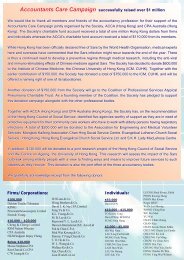Download - Hong Kong Institute of Certified Public Accountants
Download - Hong Kong Institute of Certified Public Accountants
Download - Hong Kong Institute of Certified Public Accountants
You also want an ePaper? Increase the reach of your titles
YUMPU automatically turns print PDFs into web optimized ePapers that Google loves.
Do dead people have to pay taxes?<br />
That question springs up regularly<br />
on websites such as Yahoo! Answers.<br />
Bereaved family members usually post<br />
it, although occasionally there’s something in<br />
the ensuing discussion that suggests the ghost<br />
posted it directly. “Why should I pay? I have<br />
stopped using public amenities.”<br />
(There must be Internet terminals in<br />
heaven, otherwise my kids are going to flatly<br />
refuse to go there.)<br />
Anyway, the question always gets one <strong>of</strong><br />
two responses. Amateur respondents who<br />
post answers just to earn website loyalty points<br />
say: “Don’t be silly, if you’re dead you can’t pay<br />
up.” <strong>Accountants</strong> give the opposite answer:<br />
“Of course you do. Tax collectors laugh at folk<br />
who use being dead as an excuse not to pay.”<br />
The pr<strong>of</strong>essionals are right, <strong>of</strong> course.<br />
In India, dead people pay income tax regularly,<br />
sometimes for years. Madan Kumari<br />
Jain <strong>of</strong> Delhi has been paying about 200,000<br />
rupees (HK$28,000) a year in tax for the<br />
past five years. She died in 2007. A tax <strong>of</strong>fice<br />
in Mumbai revealed that it had taken in 40<br />
million rupees from corpses in the past five<br />
years, The Times <strong>of</strong> India reported recently.<br />
This information came out when an activist<br />
filed a freedom <strong>of</strong> information request, but<br />
the ensuing news reports failed to explain<br />
why exactly dead people would pay income<br />
tax. The possible theories, I reckon, are these:<br />
1. She died owing tax money and her heirs<br />
are settling her death duties in stages.<br />
2. She died but nobody noticed, so the tax<br />
bills come in and the company accoun-<br />
60 December 2012<br />
Let’s get fiscal<br />
Get your daily dose <strong>of</strong> Nury’s humour at www.mrjam.org<br />
No escape from death and taxes<br />
Revenue collectors laugh at folks who think being<br />
dead is an excuse not to pay, warns Nury Vittachi<br />
tant sends out the cash as a habit.<br />
3. She so loved paying tax that her corpse<br />
rises from the grave once a year to file tax<br />
returns.<br />
4. The money is intended for the Heavenly<br />
Tax Department in the afterlife but there<br />
has been an address mix up.<br />
5. The Indian Department <strong>of</strong> Revenue has<br />
changed the rules so that every resident<br />
or former resident pays taxes every year,<br />
dead or alive, backdated to the beginning<br />
<strong>of</strong> time and stretching forwards to eternity.<br />
Now if you know anything about the<br />
Indian government, you’ll know that the fifth<br />
option is by far the most likely, and if they<br />
hadn’t thought <strong>of</strong> doing that yet they will after<br />
reading this article.<br />
While I was preparing this piece, one<br />
reader commented that a friend <strong>of</strong> hers had<br />
received a tax bill addressed to a recently deceased<br />
relative. She said: “He simply sent it<br />
back with a note saying: ‘The person you want<br />
has changed address’ and then added the address<br />
<strong>of</strong> the local cemetery. He heard no more<br />
from the tax <strong>of</strong>fice.” The envelopes are probably<br />
piling up in front <strong>of</strong> the gravestone.<br />
There was an interesting case in the United<br />
States in which tax <strong>of</strong>ficers received letters<br />
from 250 dead people specifying that<br />
they had not earned much recently, and thus<br />
were entitled to tax refunds. The total sum<br />
requested was US$2 million. Most tax <strong>of</strong>fice<br />
staff ignored the requests. But a few did pay<br />
up. It turned out to be a scam by two live villains.<br />
I feel sorry for any real ghosts dealing<br />
“ Madan Kumari<br />
Jain <strong>of</strong> Delhi has<br />
been paying about<br />
200,000 rupees<br />
(HK$28,000) a year<br />
in tax for the past<br />
five years. She died<br />
in 2007.”<br />
with tax matters at that time.<br />
Also from the U.S., a reader told me that<br />
ghosts in Michigan probably rejoiced one<br />
season when posters went up all over town<br />
saying: “Posthumus Tax Cuts.” But it wasn’t<br />
an adjustment to the tax rates in the afterlife.<br />
It turned out to be the campaign slogan <strong>of</strong> a<br />
candidate called Dick Posthumus. He didn’t<br />
get many votes. People wanted their tax cuts<br />
before death.<br />
This seems a reasonable request. After<br />
all, like the ghost who wrote to Yahoo! Answers<br />
noted, dead people aren’t exactly a<br />
drain on the public purse. They don’t even<br />
use doors anymore.<br />
Nury Vittachi is a bestselling author, columnist, lecturer and<br />
TV host. He wrote the <strong>Institute</strong>’s first two storybooks, May<br />
Moon and the Secrets <strong>of</strong> the CPAs and May Moon Rescues<br />
the World Economy. A third, May Moon’s Book <strong>of</strong> Choices,<br />
was published in August.

















